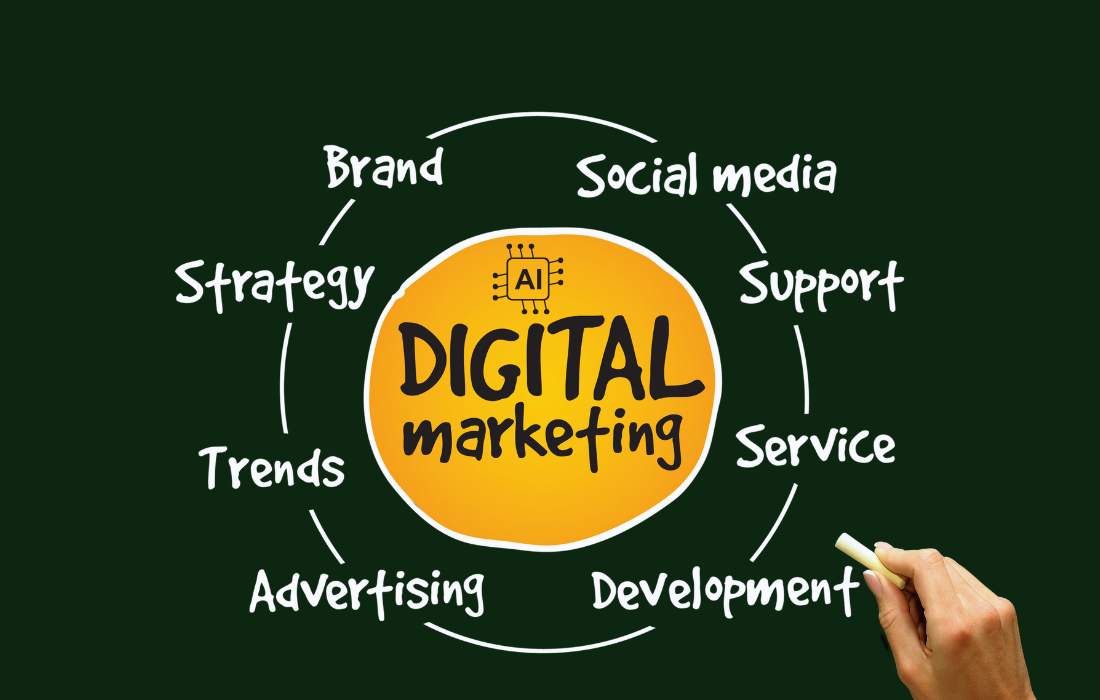In 2025, artificial intelligence (AI) is no longer an emerging trend—it’s the backbone of many successful digital marketing strategies. From enhancing personalization to optimizing campaign performance, AI has fundamentally changed how brands interact with their audiences. For businesses aiming to stay relevant, understanding and adapting to AI-driven strategies is not optional—it’s essential.
Key Areas Where AI Is Making a Difference
1. Smarter Content Creation
AI tools are transforming how content is created, making it faster and more effective. Platforms like ChatGPT, Jasper, and Copy.ai are helping marketers write blog posts, email campaigns, and social media updates in record time. These tools analyze audience behavior, trending topics, and keyword performance to produce content that aligns with both SEO goals and user intent.
The global AI content creation market is projected to grow to over $10 billion by 2026, emphasizing its central role in future content strategies.
2. Advanced Search Engine Optimization (SEO)
AI is bringing precision and efficiency to SEO. Tools such as Surfer SEO and Clearscope analyze millions of search results to suggest optimal keyword placement, content structure, and related terms. Additionally, Google’s algorithms are AI-based systems that interpret search intent rather than just keywords, delivering more relevant results.
With Google processing over 8.5 billion searches daily, integrating AI into your SEO strategy is more important than ever to ensure visibility and relevance.
3. Hyper-Personalized Paid Advertising
AI has revolutionized paid advertising. Platforms like Google Ads and Meta Ads use machine learning to automate bidding, optimize ad placements, and tailor messages based on user behavior. This means better ad targeting, lower cost-per-click, and higher ROI.
Companies that employ AI-driven personalization in their advertising have seen up to a 30% increase in conversion rates, showing how powerful real-time audience targeting can be.
4. AI-Powered Chatbots & Customer Support
Modern AI chatbots can handle complex queries, personalize responses, and even upsell products. Tools like Intercom and Drift allow businesses to offer 24/7 customer service, qualify leads, and automate routine tasks without sacrificing user experience.
By 2025, it’s expected that 95% of customer interactions will be handled without a human agent, making AI chatbots a must-have for scalable support.
5. Predictive Email Marketing
AI is also enhancing email campaigns by analyzing user behavior to determine optimal send times, subject lines, and content variations. Tools like Mailchimp’s AI and Klaviyo leverage machine learning to increase engagement and reduce unsubscribes.
Personalized emails driven by AI achieve open rates 188% higher than generic ones, proving that relevance and timing are key.
Future Trends in AI & Digital Marketing
- AI-Generated Videos: Platforms like Synthesia allow marketers to create professional-grade videos from simple scripts, saving time and costs.
- Influencer Discovery Tools: AI helps brands identify influencers whose audience aligns with their brand values and target demographics, improving campaign authenticity.
- Voice Search Optimization: With more than 50% of searches predicted to be voice-based in coming years, optimizing content for voice is essential.
- Ethical AI Use: Transparency in data handling and algorithm fairness will become increasingly important as consumers grow aware of how their data is used.
Benefits of Using AI in Digital Marketing
- Efficiency: AI automates time-consuming tasks, freeing marketers for strategic planning.
- Scalability: AI allows for real-time decision-making across multiple campaigns and platforms.
- Accuracy: Machine learning improves targeting and segmentation, ensuring messages reach the right people.
- Data-Driven Decisions: Predictive analytics offer valuable insights into customer behavior and campaign effectiveness.
Challenges & Ethical Considerations
While AI offers many benefits, it’s not without its challenges:
- Bias in Algorithms: If AI tools are trained on biased data, they can replicate and amplify these biases.
- Data Privacy Concerns: As personalization increases, brands must ensure compliance with GDPR and other data protection laws.
- Over-Reliance: While automation is helpful, removing the human touch entirely can result in generic or robotic communication.
- Cost Barriers: High-end AI solutions may be out of reach for smaller businesses without sufficient investment or technical expertise.
Conclusion
AI is no longer a futuristic concept—it’s the present reality of digital marketing in 2025. From smarter content creation and predictive analytics to personalized advertising and automated support, AI is transforming how brands connect with audiences. Companies that embrace this change will gain a competitive edge through improved efficiency, better targeting, and more meaningful engagement.
As AI continues to evolve, the key to success will be using it ethically, creatively, and strategically. The future is intelligent—and it’s already here.

